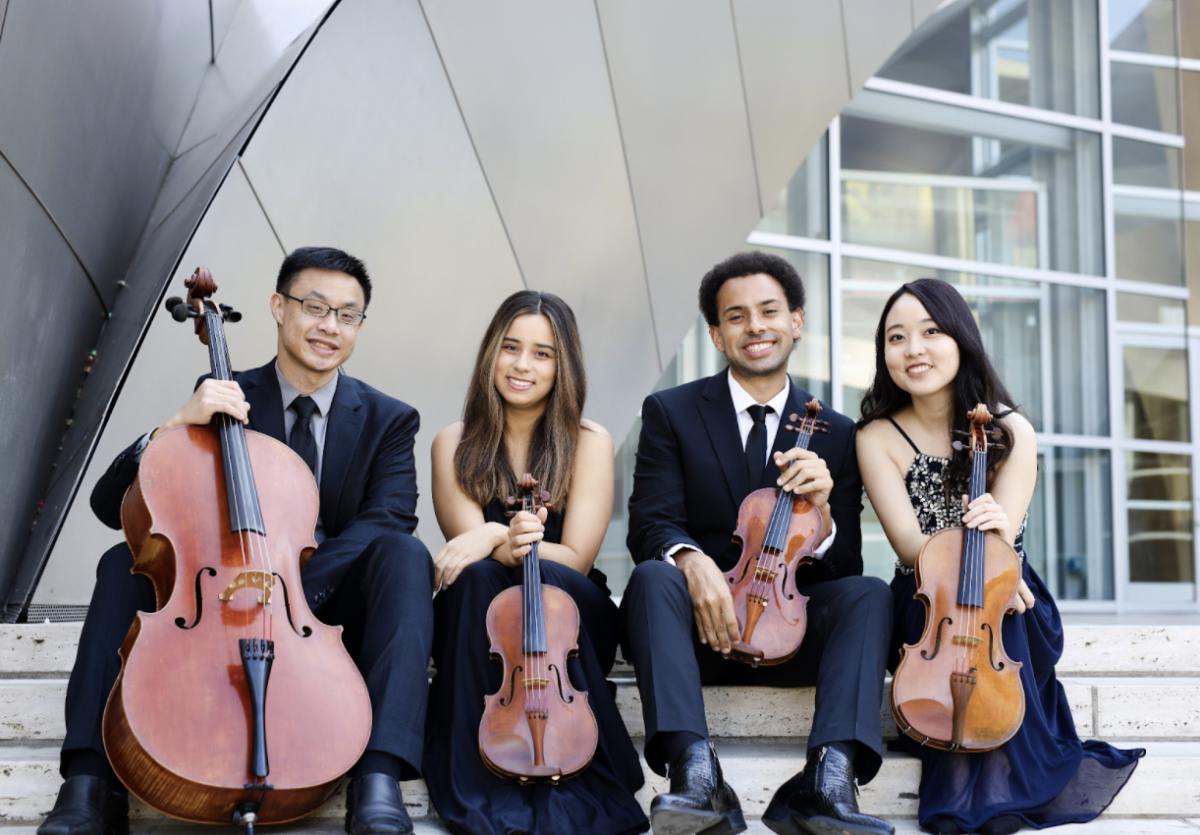The Zelter String Quartet, Lerman Gold Prize winner of Chesapeake Chamber Music’s ninth biennial international competition, performed in concert Saturday night at Ebenezer Theatre, the jewel of downtown Easton’s Prager Family Center for the Arts.
“Chesapeake Music was our first major competition,” Allan Hon, cellist and spokesman for the Los Angeles-based quartet, said in a phone interview before the Oct. 23 recital, which remains available on livestream through Oct. 30. Named for Arnold Lerman, founder of the competition, and his late wife Zena, the award included a $10,000 prize and the prestige of being judged the best of 50 emerging chamber ensembles from across the globe.
The Ebenezer program opened with Mozart’s appropriately celebratory “Hunt” String Quartet, given the award-winning circumstances and the joy of playing live again or attending a concert in person, although proof of COVID vaccination and masking were still required on Saturday.) The piece, fourth in a series created after Mozart finally met Haydn, his musical hero, takes its nickname from the opening theme suggesting a hunting call. The violin duet of Gallia Kastner and Kyle Gilner mimic a pair of clarion horns grounded to the fox hunt terrain by Allan Hon on cello with Nao Kabota’s violin powering the aural sense of a chase. By sharp contrast, the second movement offers a stately ballroom dance followed by an adagio that comes across as a lullaby eliciting alternately soothing and restless dream sequences. The finale reverts to the hunt motif with a high-low call and response of violins to cello and viola evoking a pell-mell pursuit of the prey.
As Hon announced the program would be “switching gears,” the foursome deviated sharply from the classical repertoire to a trio of Nordic folk tunes that few if any in the audience of about 120 had ever heard. Gilner switched to first-violin position occupied by Kastner on the Mozart for a flowingly melodic 18th-century minuet. The middle of the three pieces arranged by the Danish String Quartet suggested a wistful recollection of better days past and darker days ahead as a Scandinavian winter approaches. The pace quickened exponentially with “The Peat Dance” bringing to mind a furious square dance with no time for a doe si doe.
In Ravel’s String Quartet, the concert finale, the Zelter four made the most of their chance to demonstrate why they’ve been critically praised for “seemingly effortless precision” and “harmonic fusion” (LA Opus online arts website). “This Ravel is one of my personal favorites,” Hon said in the earlier interview. “It’s so textured and gorgeous to the ear.”
Best known as a brilliant composer for orchestra and the piano, Ravel wrote his sole string quartet–a 1903 masterpiece–at age 28, inspired by Debussy, who also wrote but one quartet. The opening sonata-style movement presents a neo-classical theme revisited throughout. The second movement scherzo, richly delivered with fierce pizzicato (plucked strings) punctuating a rhythmically complex syncopation as individual artists pluck their three different instruments in perfect simultaneity. The third-movement nocturne opens with a sumptuous melody introduced by cello and viola interrupted, like recovered memories, by brief returns to prior themes. Executing the final movement’s sober intensity, warily pondering an uncertain future, the Zelter musicians played as if that future was happening today.
Bravo and best of luck in what should be a bright Zelter future.
The Chesapeake competition, held every two years, was hampered in 2020 by the pandemic. Although the quest for the prize began, as usual, with chamber ensembles submitting recordings for blind judging, some struggled to find a way to play together safely. The five finalists, chosen from among the 50 recordings, performed virtual 45-minute sets instead of the live-in-Easton festival performances of past competitions. A finalist based in Switzerland was eliminated because quarantining left one of its musicians stranded in Germany past the finals deadline.
Three of the original members of the winning Zelter String Quartet have been playing together since 2018. At first, they performed for post-graduation course credit at the University of Southern California’s Thornton School of Music. “But our goal was always to perform professionally together,” Hon said. One of Zelter’s two violinists moved from California to continue studies elsewhere and was replaced by Gallia Kastner last November–in time to compete for the Lerman prize. Kastner, a master’s degree candidate at Colburn Conservatory in L.A., is concertmaster of the American Youth Symphony and has performed as a soloist with both the Chicago and Cleveland symphony orchestras.
Upon her arrival, Kastner joined Kyle Gilner in sustaining Zelter’s two-violin identity. Gilner, who holds degrees from USC’s Thornton school and the Cleveland Institute of Music, studied in masterclasses led by the Schubert Ensemble of London. His return from abroad completed the original Zelter foursome, led by Allan Hon on cello, whose first recruit was violist Nao Kubota, a fellow USC Thornton alum who earned a music master’s degree and a graduate certificate in viola performance.
Hon earned his bachelor’s degree from Rice University in Texas, his master’s from Yale and doctorate in musical arts from USC. A multiple competition prizewinner as a soloist, he has performed extensively in Europe and Asia as well as North America. Each resume of the four Zelter musicians now prominently notes the Chesapeake Chamber Music gold prize.
The quartet is named for Carl Friedrich Zelter, Felix Mendelssohn’s composition teacher and an early influence on his career. Mendelssohn’s String Quartet No. 1 was the first piece these young musicians–now in their mid-20s to age 30–worked on when they came together.
Steve Parks is a retired New York arts writer and critic now living in Easton.
ZELTER STRING QUARTET
Winners of the 9th Chesapeake International Chamber Music Competition in concert at Easton’s Ebenezer Theatre. Available on livestream through Oct. 30, chesapeakemusic.org




Write a Letter to the Editor on this Article
We encourage readers to offer their point of view on this article by submitting the following form. Editing is sometimes necessary and is done at the discretion of the editorial staff.